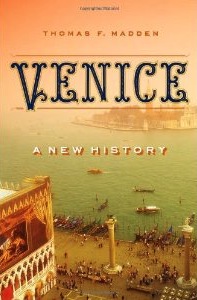 Western tradition is studded with iconic cities representing moments in time, from Periclean Athens to Victorian London, but none is as protean as Venice. The Italian city is at once: a mudbank shantytown founded by survivors fleeing the fifth-century ruin of the Roman world; the powerful seagoing republic known as La Serenissima (“most serene”), which sent Marco Polo all the way to Cathay, and whose doge annually married the sea by tossing a ring into the Adriatic; Casanova’s art-stuffed city of masques (and masks), so redolent of Poe’s “The Cask of Amontillado”; and the modern Disneyland writ large, sinking under the weight of its millions of tourists.
Western tradition is studded with iconic cities representing moments in time, from Periclean Athens to Victorian London, but none is as protean as Venice. The Italian city is at once: a mudbank shantytown founded by survivors fleeing the fifth-century ruin of the Roman world; the powerful seagoing republic known as La Serenissima (“most serene”), which sent Marco Polo all the way to Cathay, and whose doge annually married the sea by tossing a ring into the Adriatic; Casanova’s art-stuffed city of masques (and masks), so redolent of Poe’s “The Cask of Amontillado”; and the modern Disneyland writ large, sinking under the weight of its millions of tourists.
But none of those images captures Western history as a whole because, as Madden’s lively new history—the first in English in a generation—makes clear, Venice was always integral to Europe and slightly out of sync with it, always a little ancient and a lot proto-modern, even while the rest of the Continent was thoroughly medieval. While mainstream Europe was a collection of agriculture-based feudal states, Venice was an urban capitalist republic, a pioneer in deposit banking and double-entry bookkeeping.
“The first Venetians were Romans,” Madden notes, and they held fast to their roots for over a millennium. The openness of their democracy varied considerably over time, but Venetians never abandoned their republican government or had a less than broad-based ruling elite. Although La Serenissima and the U.S. co-existed for only two decades before Napoleon swept away the former, John Adams, one of the founding fathers of the world’s newest republic, carefully studied the institutions of the world’s oldest. Perhaps he was struck by its system of checks and balances, which makes American political gridlock look streamlined: at one point,Venice required nine groups, consisting of 282 electors chosen largely by lot, just to nominate a doge, a process, writes Madden, “meant to be so cumbersome that only God could influence it.” Rather like the U.S. House of Representatives.